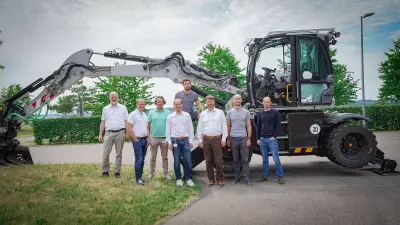Federated Learning
Start of Bosch and AIT’s joint research project “Federated Learning — Enabling Swarm Intelligence”

Bosch Research and the Austrian Institute of Technology (AIT), Austria's largest non-university research institution, intend to strengthen their research partnership in the field of federated learning over the next three years. The collaboration with the AIT Center for Vision, Automation & Control is based on a long-standing, very successful partnership between Bosch Research and AIT in the field of control engineering. The focus has been on adaptive and locally learning algorithms. With federated learning, we are now taking the next step towards connected machines and components which are able to learn together.
What is federated learning?
Machine learning algorithms are already in use today, they perform tasks ranging from the precise control of a fuel cell to the automation of mobile machines. An example: When an excavator is operating, three hydraulic cylinders must be controlled at the same time using joysticks. These movements depend on each other, but differ greatly from one machine to another. An excavator operator learns this behavior over time and can then precisely control the excavator. Together with Bosch Rexroth, Bosch Research is developing assistance functions for less experienced excavator drivers, e.g. for precise leveling. These are based on machine learning. The foundations for this are explained in the blog article from Bosch Research on “Learning Control for Advanced Excavator Assistance Functions“.
The required models can be trained in a decentralized manner on the control units of the individual machines (local learning). However, certain systems cannot benefit from the experience of other systems in the fleet. With federated learning, models, i.e. knowledge about the behavior of a number of machines, can be combined in the cloud to produce an improved overall model. Specifically, individual machines which are already used under extreme conditions such as sub-zero temperatures can pass on the knowledge they have acquired to other machines. Or defective machines can be detected due to deviations from “normal behavior” of the other machines. Because only the learned model rather than the recorded data are exchanged, this method of machine learning complies with data protection requirements, making it suitable for use in an increasingly connected world.
The aim of this research collaboration is to transfer the concept of federated learning which was developed in other IT areas to complex non-linear, dynamic systems, to implement it in selected applications, and to exploit the added value of federated learning for Bosch.
The focus of AIT’s work during the project is to identify scientific gaps and close them with new methods or algorithms. Bosch Research contributes the industrial requirements and example applications on which the concept is implemented and then applies the developed methods industrially in the Bosch business units.
Continually improving products “in the swarm”
Federated learning allows the transfer of knowledge across machines. As a result, system properties can be continuously improved during operation — across an entire fleet of machines, not just on the individual system as was previously the case.
Scalability is particularly important here, to ensure that the methods developed can be applied to a wide range of Bosch products.